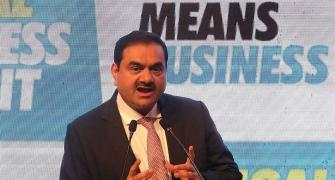The current cap on H1-B visas could lead to a situation where those having the visas demand fatter salaries, which, in turn, could trigger a slight wage inflation. It could also, perhaps, give a boost to the offshoring story since hiring Indians onsite will be increasingly difficult in the quota regime, some sector analysts said.
Most IT firms are in a silent period in the run-up to their annual results announcement, yet the discontentment is very much in the air. Many of the large Indian IT firms are deep in the services space who send their employees to clients' premises onsite on a regular basis.
"Services companies won't feel comfortable with the rising number of H1-B visa petitions due to their huge onsite deployments. However, for an engineering outsourcing firm like us, this is not much of a problem since we can deliver works out of India," Nitin Pai, Head - Worldwide Marketing, Tata Elxsi said.
He added the decision by the US authorities to go for either lottery or either random selection of visa petitions is 'unfair'. A source from Wipro Ltd: "Yes, I personally feel while this will surely have some impact, it will not be felt very strongly."
Whatever the case be, for Indian IT companies with at least 50 per cent and more projects coming from the US, this means uncertainty.
Hari T, director and senior vice president- HR, Satyam said, "At one level, this could be the only rational way of dealing with a huge number of applications without being biased but as a company we think this brings in uncertainty and ambiguity to our future plans." Though the company did not give the number of applications filed this year, it had filed 1,500-1,800 applications last year.
The number of new H-1Bs issued each year in the United States is subject to an annual Congressionally-mandated quota. Those beneficiaries not subject to the annual quota are those who currently hold H-1B status or have held the H-1B status at some point in the past six years and have not been outside the US for more than 365 consecutive days.
This annual quota has had a significant impact on the high-tech industry. It has generally been set at 65,000 visas per year with some exceptions for workers at exempt organisations like universities and non-profits.
Time and again, both US (read Silicon Valley) and Indian companies have repeatedly stressed the need to raise the cap, which was reduced from 1,95,000 to 65,000 two years ago. Kiran Karnik, president, Nasscom in a press statement said: "We feel the cap should be large enough to allow market forces to operate freely within it, as happened when it was 195,000. Constraining the supply when demand is high gives rise to problems for both US and Indian IT companies."
Industry experts note the situation has been same for the last two years and companies have been using options like L1 visa and near-shoring options to overcome the problem. But there are problems. Like L1, it is not as easily available as H1-B.
The US Citizenship and Immigration Services will use a random selection process for all cap-subject filings received on April 2, 2007 and April 3, 2007. It will reject and return along with filing fee(s) all petitions received on those days that are not randomly selected.
Petitioners may re-submit petitions on April 1, 2008 when H-1B visas become available for FY 2009. This is the earliest date for which an employer may file a petition requesting FY 2009 H-1B employment with a start date of October 1, 2008.







